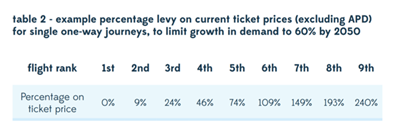FST BLOG
A Case for the Frequent Flyer Levy
- 16 March 2020
- Environment
- Abu Jaffar-Latif

Introduction
In 2018 the IPCC released a report which highlighted the devastating effects a 2°C rise in global temperatures would have. The likelihood of extreme weather such as heatwaves, floods, and droughts would all increase significantly, becoming regular aspects of our climate rather than rare phenomena. Clearly, a 2°C rise would change life as we know it. By limiting the rise to 1.5°C, there will still be extreme weather effects, but not at the catastrophic scale that 2°C brings. However, to even have a chance to limit temperature increase to 1.5°C the IPCC claims it would require “rapid and far reaching” change.
Given the importance of acting now, the United Kingdom must do what it can to reduce its emissions. One sector which has been largely untouched by environmental legislation is aviation. According to the Committee on Climate Change (CCC), aviation produced 6% of UK emissions in 2011[1], but this is expected to rise to 25% by 2050[2]. If this is allowed to happen, there is little chance for the UK to achieve net zero by 2050, and so the CCC have recommended to limit growth in passenger demand to no more than 60%. Data shows that 70% of all UK flights are made by 15% of the population[3], thus any policy aiming to reduce aviation emissions must find a way at deterring this 15%. This is why a frequent flyer levy is vital rather than simply increasing Air Passenger Duty (APD)
Frequent Flyer Levy (FFL)

FFL will progressively charge flyers with each additional flight taken in a 12-month period (Table 2). This makes the FFL far better than APD, as research by the Anthony Rae Foundation (RAF) has shown that the FFL will deter the wealthiest flyers from excessive flights without making flying inaccessible for all. Only those who fly more than 2 times a year will actually notice a difference in price, leaving 85% of the British population unaffected. In addition, with £3.4 billion raised in 2017 from APD, according to RAF, a FFL could double this government revenue. This revenue could and should be used to invest in green transport alternatives such as high speed rail, while also funding Research and Development in the aviation sector. Fundamentally, a FFL can help provide science and technology the valuable time and resources needed to develop innovate solutions to our climate change problems, while tackling the problem from a policy perspective.
Objections to the FFL
A major worry about the FFL has been the effect on British Business. In post Brexit-Britain, it is vital that the government does not make it more difficult for businesses to establish new global trade relations. There are two potential solutions to this issue. First, the FFL could provide exemptions for UK businesses. Some may argue that this undermines the FFL’s ability to reduce emissions. However, business flights have been in decline since 2008[4], making up only 10% of all UK flights. The FFL will be able to achieve the CCC recommendations, for it reduces demand in the fastest growing sector of aviation: flights for leisure[4]. This will ensure that businesses will not feel the increased cost of flying, while simultaneously ensuring that emissions are reduced.
A second, and better long-term option, may be providing businesses with a flight allowance based on number of employees. This will ensure that the wealthy cannot simply start or use their business for leisure flights, while also ensuring that business also take on their fair share of burden to reduce carbon emissions.
Conclusion
With the importance of acting now to reduce carbon emissions, it is vital that a FFL is implemented. With the aviation sector’s growth showing no signs of slowing down, and with science and technology needing time to innovate and develop more efficient aviation methods, it is clear that government must step in and implement policy which provides scientists with the much needed time and resources to find solutions to our climate crisis. Hence, the case for a FFL has never been stronger.
Jaffar Latif is student at University College London studying PPE. In summer 2019 he was an intern at the Foundation for Science and Technology. Jaffar has a keen interest in Political Philosophy and is specialising in the role of ethics in Public Policy.
